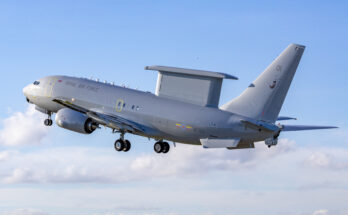After years of waiting, the German Navy finally commissioned into service the first of its new-generation “super frigates,” the F125 Baden-Württemberg, on June 17.
Am 17. Juni hat die Deutsche Marine die Fregatte „Baden-Württemberg“, das Typschiff der Klasse F125, in die Flotte übernommen. Sie ist Spezialist und Multitalent in einem.#deutschemarinehttps://t.co/Op5iPHBZhh pic.twitter.com/exXImfMJHp
— Deutsche Marine (@deutschemarine) June 18, 2019
The tortured path of bringing the new-generation F125 into service dates back to the mid-2000s, when defense planners sought a type of ship to partially replace the German Navy’s eight legacy Bremen class F122 frigates.
Seeking a multimission platform to reduce the need for a like-for-like ship replacement – thereby ensuring lower maintenance, operational and personnel costs during a time of declining defense investment – the German military opted for the world’s largest frigate design at 7,000 tons.
The thinking behind this selection was that these ships would ostensibly be able to deploy far from home waters for up to two years with minimal port calls – all while being operated by smaller crews than those serving on the F122’s predecessors.
The project got underway in June 2007, with contracts worth EUR2.27 billion ($3 billion at the time) inked with the ARGE F125 consortium (comprising ThyssenKrupp Marine Systems as lead contractor and Friedrich Lurssen Werft and Blohm + Voss as supporting contractors) for four ships.
Production of the lead ship Baden-Württemberg began in June 2011 and its christening followed in 2013. Delivery of the ship was originally scheduled for 2014-15, but was pushed out to 2017 after problems cropped up during construction.
By May 2017 a report had emerged that the much-delayed F125 class of frigates were overweight and slightly listing by 1.3 degrees starboard. The German Defense Ministry responded to the leaked confidential report by saying that all design and performance parameters would be met and that some initial degree of listing is common in a new ship line, but that industry would rectify the issue with appropriate countermeasures.
Yet in December 2017 the ship was determined to be un-seaworthy by the German Navy following a trial period, marking the first time the service had rejected a warship for failing to meet minimum operating standards. After the ship failed its sea trials, German naval officials essentially returned it to its builder. Indications at the time were that the ship’s central computing system, radar, and electronics and the flameproof coating on its fuel tanks all proved to be problematic or insufficient.
While ThyssenKrupp Marine Systems insisted that all issues would be corrected and the ship delivered in 2018, official entry into service continued to be delayed.
And despite the news of the Baden-Württemberg’s commissioning, there remain concerns in some corners that the entire F125 class represents an expensive, unworkable naval surface warfare platform that will prove expensive for the German Navy to maintain and incapable of tackling Russian submarines due to the absence of anti-submarine sonar and anti-submarine warfare weaponry (the ships are, however, capable of carrying two NFH90 Sea Lion helicopters).
Lacking area air defense capability – just two 21-cell RIM-116 Rolling Airframe Missile close-in weapons system turrets for point defense – the ships are also potentially susceptible to enemy attacks. And the ships are slow, capable of achieving top speeds of no more than 26 knots (30 mph).
The F125s are primarily intended for low-threat environments. Once in service, they can be expected to perform stabilization, crisis management, and conflict prevention missions. Hence, despite their large size, the new frigates are more suited for tackling lower-intensity operations – such as defending against asymmetric threats, providing tactical fire support for troops on shore, and providing support for Special Forces and for evacuation missions – than for high-intensity surface warfare.
Rather than acting as true warships, these ships appear designed more for diplomatic (showing the flag and making port calls) punch and counter-piracy missions – a distinction that no doubt suits the German political and foreign policy establishment just fine.
With the Baden-Württemberg having finally entered service, the German Navy now awaits handover of the remainder of the class, with second ship North Rhine-Westphalia slated for delivery this year and the other two ships, Rheinland-Pfalz and Sachsen-Anhalt, following successively through 2021.

Dan Darling is Forecast International’s director of military and defense markets. In this role, Dan oversees a team of analysts tasked with covering everything from budgeting to weapons systems to defense electronics and military aerospace. Additionally, for over 17 years Dan has, at various times, authored the International Military Markets reports for Europe, Eurasia, the Middle East and the Asia-Pacific region.
Dan's work has been cited in Defense News, Real Clear Defense, Asian Military Review, Al Jazeera, and Financial Express, among others, and he has also contributed commentary to The Diplomat, The National Interest and World Politics Review. He has been quoted in Arabian Business, the Financial Times, Flight International, The New York Times, Bloomberg and National Defense Magazine.
In addition, Dan has made guest appearances on the online radio show Midrats and on The Media Line, as well as The Red Line Podcast, plus media appearances on France 24 and World Is One News (WION).




